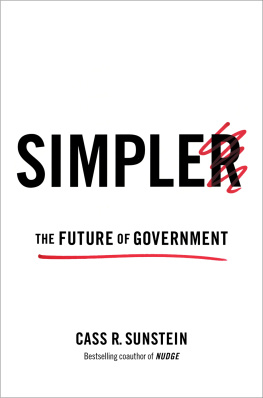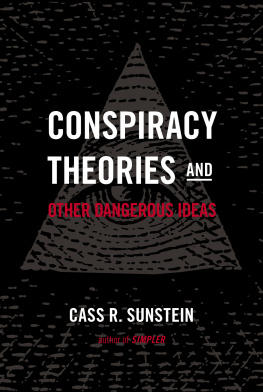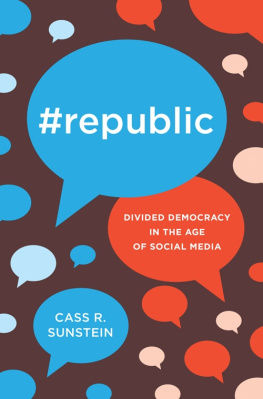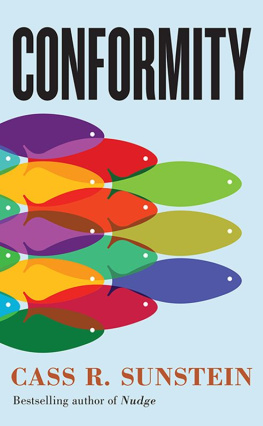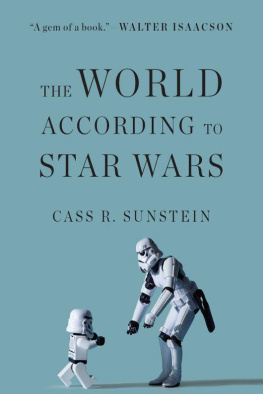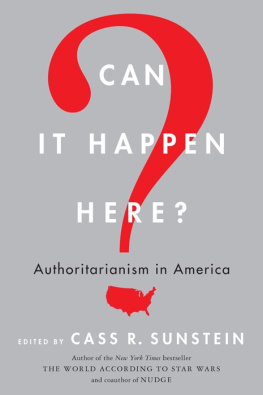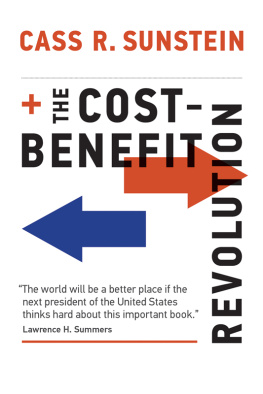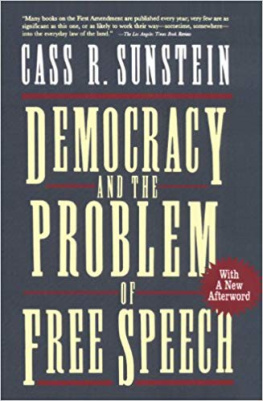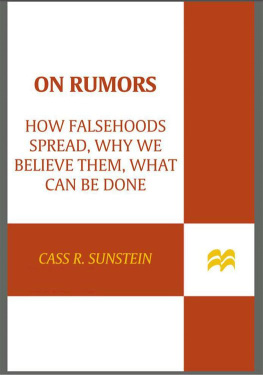Cass R. Sunstein - Too Much Information: Understanding What You Dont Want to Know
Here you can read online Cass R. Sunstein - Too Much Information: Understanding What You Dont Want to Know full text of the book (entire story) in english for free. Download pdf and epub, get meaning, cover and reviews about this ebook. year: 2020, publisher: MIT Press, genre: Politics. Description of the work, (preface) as well as reviews are available. Best literature library LitArk.com created for fans of good reading and offers a wide selection of genres:
Romance novel
Science fiction
Adventure
Detective
Science
History
Home and family
Prose
Art
Politics
Computer
Non-fiction
Religion
Business
Children
Humor
Choose a favorite category and find really read worthwhile books. Enjoy immersion in the world of imagination, feel the emotions of the characters or learn something new for yourself, make an fascinating discovery.

- Book:Too Much Information: Understanding What You Dont Want to Know
- Author:
- Publisher:MIT Press
- Genre:
- Year:2020
- Rating:4 / 5
- Favourites:Add to favourites
- Your mark:
- 80
- 1
- 2
- 3
- 4
- 5
Too Much Information: Understanding What You Dont Want to Know: summary, description and annotation
We offer to read an annotation, description, summary or preface (depends on what the author of the book "Too Much Information: Understanding What You Dont Want to Know" wrote himself). If you haven't found the necessary information about the book — write in the comments, we will try to find it.
Cass R. Sunstein: author's other books
Who wrote Too Much Information: Understanding What You Dont Want to Know? Find out the surname, the name of the author of the book and a list of all author's works by series.
Too Much Information: Understanding What You Dont Want to Know — read online for free the complete book (whole text) full work
Below is the text of the book, divided by pages. System saving the place of the last page read, allows you to conveniently read the book "Too Much Information: Understanding What You Dont Want to Know" online for free, without having to search again every time where you left off. Put a bookmark, and you can go to the page where you finished reading at any time.
Font size:
Interval:
Bookmark:
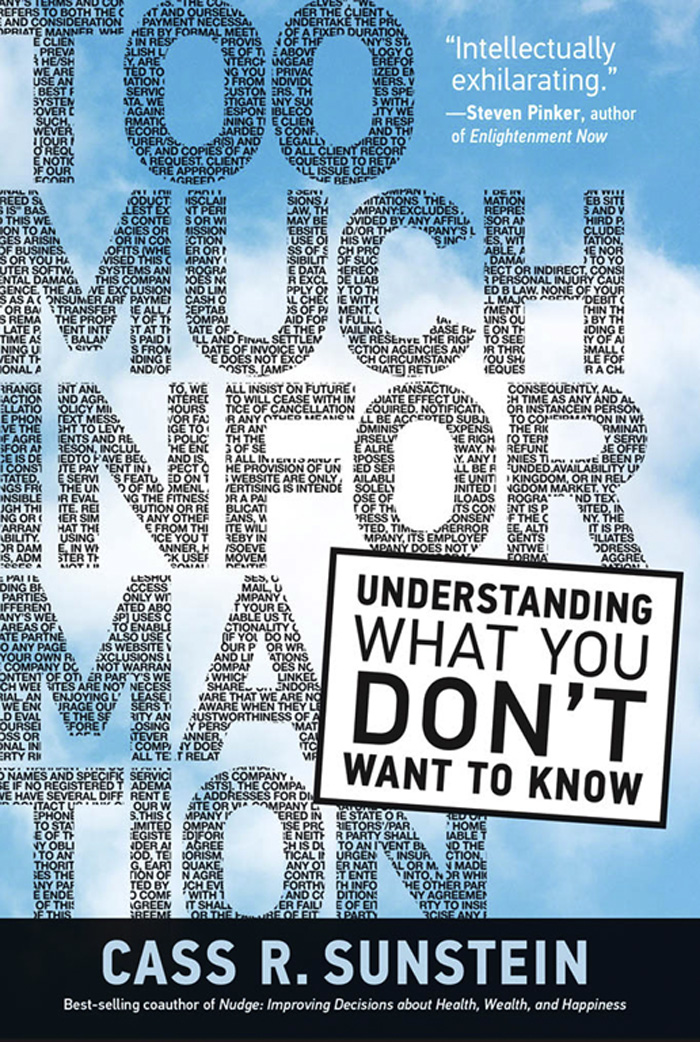
Cass R. Sunstein
The MIT Press
Cambridge, Massachusetts
London, England
2020 Cass R. Sunstein
All rights reserved. No part of this book may be reproduced in any form by any electronic or mechanical means (including photocopying, recording, or information storage and retrieval) without permission in writing from the publisher.
This book was set in ITC Stone Serif Std and ITC Stone Sans Std by New Best-set Typesetters Ltd.
Library of Congress Cataloging-in-Publication Data
Names: Sunstein, Cass R., author.
Title: Too much information : understanding what you dont want to know / Cass R. Sunstein.
Description: Cambridge, Massachusetts : The MIT Press, [2020] | Includes bibliographical references and index.
Identifiers: LCCN 2019047661 | ISBN 9780262044165 (hardcover)
Subjects: LCSH: Information behavior. | Disclosure of information. | Information policy.
Classification: LCC ZA3075 .S865 2020 | DDC 025.5/24dc23
LC record available at https://lccn.loc.gov/2019047661
10 9 8 7 6 5 4 3 2 1
d_r0
Yet ah! why should they know their fate?
Since sorrow never comes too late,
And happiness too swiftly flies.
Thought would destroy their paradise.
No more; where ignorance is bliss,
Tis folly to be wise.
Thomas Grey, Ode on a Distant Prospect of Eton College
I cannot bear not to know the end of a tale. I will read the most trivial thingsonce commencedonly out of a feverish greed to be able to swallow the endingsweet or sourand to be done with what I need never have embarked on. Are you in my case? Or are you a more discriminating reader? Do you lay aside the unprofitable?
A. S. Byatt, Possession
with George Loewenstein and Russell Golman
with Oren Bar-Gill and David Schkade
with Eric Posner
The primary question in this book is simple: When should government require companies, employers, hospitals, and others to disclose information? My proposed answer is simple, perhaps deceptively so: When information would significantly improve peoples lives. Information can achieve that goal if it enables people to make better choicesfor example, about their health, their time, or their finances. Information can also improve peoples lives if it makes them happier. Unfortunately, some information does not improve peoples lives in any way. It does not improve their decisions, and it does not make them happier. Sometimes it is useless. Sometimes it makes them miserable. Sometimes it makes their decisions worse.
It might seem obvious to emphasize the need to ask about the effects of information on human lives. But in public policy circles, many people think in very different terms. They emphasize the right to know, urging that consumers and employers have a right to information, even if they will do little or nothing with it. Other people emphasize the relationship between information and personal autonomy, contending that people are freer with information than without it, even if it does not improve their lives. I will be rejecting the idea of a right to know. I will also be urging that it is far less useful to focus on autonomy than on human well-being and on what information contributes to it. At least this is so when public officials are deciding when companies, employers, hospitals, and others must disclose information.
By specifying these claims, I hope to provide a framework to answer the wide range of questions that public officials all over the world are now confrontingabout pandemics, cancer, smoking, climate change, poverty, loans, workers rights, education, sex equality, genetically modified organisms (GMOs), and distracted driving. The proposed framework is meant to clarify not only when mandatory disclosure is a good idea, but also the form that mandatory disclosure should take. And to understand my primary question and my deceptively simple answer, we have to touch on even more fundamental questions about what human beings want to know and how much they want to know itand whether in wanting to know, or not wanting to know, they might be making serious mistakes.
My interest in these questions was fueled during the Obama administration, when I was privileged to serve in the White House, helping to oversee federal regulation. A significant amount of my work involved regulations that required disclosure of informationabout calories, nutrition, workplace risks, highway safety, fuel economy, greenhouse gas emissions, credit cards, mortgages, and a lot more. The Consumer Financial Protection Bureau had a relevant slogan: Know Before You Owe.
I was enthusiastic about disclosure as a regulatory strategy. I thought that it could make peoples lives better.
One day I emailed a friend to let her know that the US Food and Drug Administration had finalized a regulation, on which I had spent a lot of time, requiring disclosure of calories at various restaurants, including movie theaters. I confess that I was enthusiastic, even excited, possibly a bit proud.
My friends email response: CASS RUINED POPCORN.
Those words were deflating, of course. But she had a point. At movie theaters, people want to have fun. They want to enjoy their popcorn. As the lights go down, they do not want to wonder whether they are getting fat. A calorie label might not exactly enhance their experience.
As we shall see, empirical work shows that my friend was right: Many people dont want to see calorie labels. In fact, they would be willing to pay real money not to see them.
Does this mean that calorie labels are a bad idea? Hardly. Their good effects might outweigh their bad effects. Some people might make better choices as a result of seeing them, and some of them might even learn to like healthier foods. This is a point about the shifting nature of tastes and values, which makes analysis especially complicated. For some people, salad tastes better, if you keep eating salad.
But the risk of ruining popcorn is important. It is a clue to something much larger and more interesting. It suggests that some information makes people feel worse or even terrible. That point might not be decisive. If you learn that you have strep throat, you will not be pleased, but you can probably find a way to get healthy. If you learn that you are performing poorly in your job, you might find a way to do better. But in some cases, ignorance really is bliss and people are better off if they are uninformed.
To the same effect, I received a much sadder lesson decades before. In 1976, my sixty-year-old, strong, very athletic father started to stumble on the tennis court. On several occasions, he nearly fell. My brother-in-law Roger, his frequent tennis partner, was deeply concerned. After a few weeks, my mother and I insisted on taking him to the hospital for a battery of tests. It was a difficult and exhausting day. My father had a flattened, glazed look in his eyes.
Several hours later, there was good news. After talking to the doctors, my mother came back into the hospital room with a bright smile on her face. She said to my Dad: You have a reprieve! Its just normal headaches. You are going to be absolutely fine. They will do a few more tests, so youll have to stay a little while. But they are sure that its nothing. The three of us had a celebratory meal, there in the hospital.
An hour later, my mother brought me into the car, to drive home. She said, flatly and without much affect, Hes going to die of a fatal brain tumor. Probably in eighteen months. Theres nothing they can do. Nothing. But we are
Font size:
Interval:
Bookmark:
Similar books «Too Much Information: Understanding What You Dont Want to Know»
Look at similar books to Too Much Information: Understanding What You Dont Want to Know. We have selected literature similar in name and meaning in the hope of providing readers with more options to find new, interesting, not yet read works.
Discussion, reviews of the book Too Much Information: Understanding What You Dont Want to Know and just readers' own opinions. Leave your comments, write what you think about the work, its meaning or the main characters. Specify what exactly you liked and what you didn't like, and why you think so.

